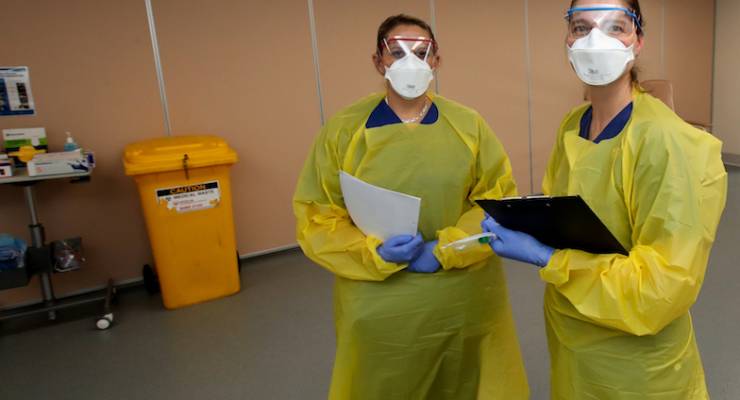
The myth that coronavirus only severely affects older people has shattered as examples of young people succumbing to the disease pour in from around the world.
A 12-year-old girl in the US is fighting for her life on a ventilator just a day after testing positive for COVID-19; an 18-year-old has been the youngest life claimed in the UK; and a premature baby in Israel is in a serious condition after catching the virus.
In fact, in Australia, patients under the age of 54 make up more than 40% of all coronavirus hospitalisations.
Are younger groups are more susceptible than first thought?
The message isn’t getting through
As of this morning, Australia had 1529 confirmed cases of coronavirus. More than half of those were people under the age of 50. People in their 20s had the most recorded cases with 284, followed by those in their 30s at 276 cases.
Eighty percent of COVID-19 cases are mild, but not everyone who gets a mild case is young. According to the latest epidemiology report (written on March 14, when there were just 295 coronaviruses cases in Australia), people between the ages of 30 and 54 made up 44.5% of all hospitalisations — 22% of the hospitalised patients were aged between 30 and 39.
This information is evolving, said Dr Michela Sorensen, a GP in Sydney’s inner city.
“Six weeks ago I was saying the same thing: that young people aren’t as affected, because that’s what was playing out,” she told Crikey. “But it’s a fluid situation. Now, the statistics are showing us more and more young people are getting it, and are getting sicker.”
But Professor Ian Hickie, co-director of health and policy at the University of Sydney’s Brain and Mind Centre, thinks it’s more than just evolving data perpetuating the myth.
“There’s a mistake being made between the percentage of people who get sick, and the actual numbers,” Hickie told Crikey.
Percentage-wise, younger generations are less likely to die from coronavirus. But given there are hundreds of thousands of cases, even a small percentage can translate into massive figures.
“Young people’s immune response to the virus can be overwhelming,” he said.
Similarly, Hickie believes young people haven’t been targeted in official communications.
“Messages have not been directed at young people, and the government has not been using 21st-century methods. There are completely vague ads about washing hands which don’t convey the fact sociable young people — particularly those who have been travelling — are spreading the disease,” he told Crikey.
Millennials have health problems too
Underlying health conditions play a massive role in coronavirus severity and susceptibility. This is a concern given that around half of all Australians suffer from a chronic disease.
“The older you get, the higher the likelihood of having an underlying medical condition,” Sorensen said. “Overall, younger people are healthier, but they’re also not immune.” She points to asthma, multiple sclerosis, diabetes, and autoimmune conditions as common illnesses.
There are more than 25,600 people living with MS in Australia, with most people diagnosed between the ages of 20 and 40. Type two diabetes is increasing in Australians under 40; coeliac disease is becoming twice as common every two decades; and asthma affects 10.3% of people aged 15-29 and 11.2% of people aged 30-44.
“Asthmatics have limited respiratory function … and are more susceptible to severe cases of coronavirus,” Sorensen said.
Around one in six men between the ages of 18 and 55 smoke cigarettes daily, which has recently been found to worsen coronavirus cases. Smokers’ lungs create more epithelial cells to compensate for limited oxygen intake, which means the virus has more cells to attack.
It’s not all in your head
It’s also common for those in younger generations to suffer from mental illness, Hickie said.
“People with mental illness don’t only have ill mental health. They [often] also smoke, use alcohol and drugs.” These are risk factors in COVID-19 severity, and the pandemic is creating a vicious cycle for these people.
“Young people are more likely to be in casual employment with no secure housing or finances,” Hickie said. “Mental health is made worse by social isolation, unemployment and a lack of incomplete education, which often leads to alcohol and drug use.”
He warned that while young people may cope better now, they’ll fare far worse once the recession kicks in. “Mental health will be the next crisis,” he predicted.
In short, coronavirus doesn’t attack age or demographics.
“It’s about being part of a group with risk factors, independent of age,” Hickie said. “We need to get that message out there.”








Given that we knew months in advance that this was likely to happen and the likely effect on the population – you would have thought we would have been better prepared. An important part of being prepared is having your communication strategy in place. Part of such a communication strategy would point out that all age groups are going to be effected and the majority of people in hospital – seriously ill – will be in the younger age groups and that death is a real possibility.
Most people I have discussed Covid-19 with are completely unaware of this and think of it as an old peoples concern.
Scotty prepared? Too busy praying.
The risk begins to climb sharply at age 40, which we knew. Hence the need for more testing to get people off the street and under observation at least ASAP. I have heard both the PM and the Chief Medical Officer say kids are not very infectious, while saying they are an infection risk in the mall, but not at school. Hmmm. Where I work there are 2 pregnant staff and several old farts like me. I am the OBE oldest bastard ‘ere and I am well over 60. The principal has sensibly weeded us out as much as possible, made much easier by Berejiklian being more in tune than Scummo, except on cruiseships.